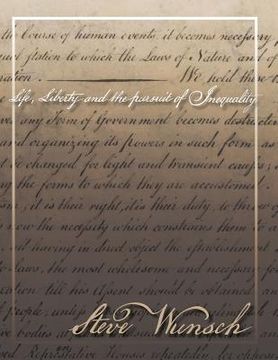Synopsis "Life, Liberty and the pursuit of Inequality (in English)"
In Life, Liberty and the pursuit of Inequality, I show how the freedoms of the English-speaking peoples led to prosperity through the ability of stock exchange founders to design and run their markets as they saw fit, without input or oversight from regulators. Did this result in rigging? Yes, it did. But their rigging created the paradigm that enabled London and New York to lead their countries and, ultimately, the world, toward the first glimmers of self-sufficiency and wealth for all. That paradigm, which I call the "do-it-yourself monopoly," first appeared tentatively around 1690 in London as forerunners of the London Stock Exchange, and then moved around 1790 to New York as forerunners of the New York Stock Exchange, but this time explicitly, as evidenced by such documents as the Buttonwood Agreement. As the D.I.Y. monopoly reached full flower with the robber barons in nineteenth century America, it underwrote a succession of the world's wealthiest men and the world's biggest businesses, as the United States became the world's greatest economic power. Today, the evident economic malaise of the wealthy western countries is traceable to their having abandoned the principles of freedom that made them wealthy, in particular with regard to how they design and run their capital markets. The collapse of the U.S. IPO market's ability to fund new technology companies and industries is examined in detail and seen as the clear consequence of this abandonment. And the rest of the west is following the U.S.'s lead. If markets had been run on the principles of modern regulators when they were forming, markets would not have formed in the first place. And since the exchanges were the essential triggers of the Industrial Revolution, blocking the exchanges would have prevented the Industrial Revolution from emerging, which would have meant that this extraordinary historical event that began lifting the world's people out of seemingly permanent and universal poverty, would not have happened, either. As demonstrated by my reexamination of some authoritative but overlooked historical works, the principles that pertained when the NYSE and LSE were forming are the key to understanding such mysteries as what triggered the Industrial Revolution in the first place, why it was originally only a British phenomenon, and why it eventually left Britain and settled in America. This chain of logic also shows that modern regulation would have prevented the emergence of the British Empire and the United States as dominant economic powers.

